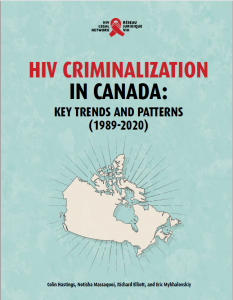 In Canada, a person living with HIV can go to prison and be registered as a sex offender for life for not disclosing their HIV-positive status to a sexual partner in some circumstances. People are usually charged with (aggravated) sexual assault, due to the Supreme Court of Canada’s ruling that HIV non-disclosure can sometimes amount to fraud that invalidates consent to sex. The Supreme Court has ruled that disclosure is only legally required if there is a “realistic possibility of HIV transmission,” but the interpretation and application of this legal test has been widely criticized as too broad. People can face charges regardless of whether they had any intent to cause harm or did indeed transmit the virus, and people have been prosecuted and convicted even if they had sex that posed negligible to no risk of transmission.
In Canada, a person living with HIV can go to prison and be registered as a sex offender for life for not disclosing their HIV-positive status to a sexual partner in some circumstances. People are usually charged with (aggravated) sexual assault, due to the Supreme Court of Canada’s ruling that HIV non-disclosure can sometimes amount to fraud that invalidates consent to sex. The Supreme Court has ruled that disclosure is only legally required if there is a “realistic possibility of HIV transmission,” but the interpretation and application of this legal test has been widely criticized as too broad. People can face charges regardless of whether they had any intent to cause harm or did indeed transmit the virus, and people have been prosecuted and convicted even if they had sex that posed negligible to no risk of transmission.
To support ongoing advocacy to address the harms of HIV criminalization, this report provides information about the temporal and demographic patterns of HIV criminalization in Canada and the outcomes of HIV non-disclosure criminal cases from 1989 to 2020. This analysis updates earlier reports published in 2012 and 2017.
READ THE REPORT:
